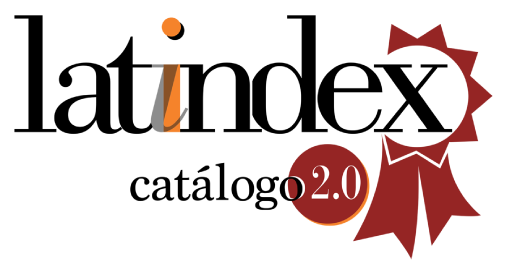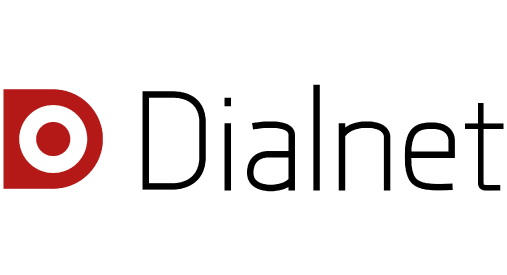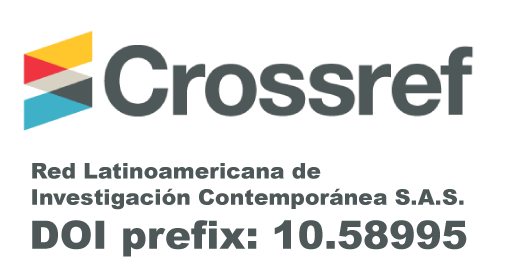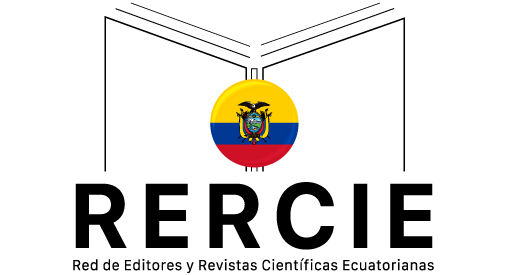Bibliometric Evaluation of Psychology Journals in Scimago: Impact and Scientific Visibility
Resumen
Introduction: This study aims to analyze psychology journals indexed in the 2023 Scimago Journal Rank (SJR) to understand their impact and scientific visibility. Methodology: A descriptive and analytical approach was employed based on secondary data collected from the SJR database. The main metrics considered include the SJR index, quartile ranking, and impact factor. Dynamic tables, visualizations, and advanced statistical analyses such as correlations were used for the analysis. Results: The results indicate a growing diversification in the field of psychology, with a notable increase in interdisciplinary and open-access journals. While high-impact journals remain dominant, there is significant growth in emerging journals with rising SJR indices. The internationalization of psychology research is evident, with broader global representation. A strong correlation between citation rates and academic impact highlights the importance of visibility and accessibility. Conclusion: The study provides a comprehensive view of the editorial landscape in psychology and suggests future research directions, such as evaluating the impact of emerging journals and tracking the evolution of trends in international publications.
Descargas
Referencias
- Adair J. G., Vohra N. (2003). The explosion of knowledge, references, and citations. Psychology’s unique response to a crisis. The American Psychologist, 58 (1), 15–23. https://doi.org/10.1037/0003-066x.58.1.15 DOI: https://doi.org/10.1037/0003-066X.58.1.15
- Ansari, K. M., Rahaman, S., & Al-Attas, H. H. (2020). Gauging the quality of behavioral science journals by using bibliometric indicators. COLLNET Journal of Scientometrics and Information Management, 14(1), 135-152. https://doi.org/10.1080/09737766.2020.1819173 DOI: https://doi.org/10.1080/09737766.2020.1819173
- Badenes-Sastre, M., & Expósito, F. (2021). Perception and detection of gender violence, and identification as victims: A bibliometric study. Anales de Psicología, 37(2), 341. https://doi.org/10.6018/analesps.434611 DOI: https://doi.org/10.6018/analesps.434611
- Ball P. (2002). Paper trail reveals references go unread by citing authors. Nature, 420 (6916), 594. https://doi.org/10.1038/420594a DOI: https://doi.org/10.1038/420594a
- Banasik-Jemielniak, N., Jemielniak, D., & Wilamowski, M. (2022). Psychology and Wikipedia: Measuring Psychology Journals’ Impact by Wikipedia Citations. Social Science Computer Review, 40(3), 756-774. https://doi.org/10.1177/0894439321993836 DOI: https://doi.org/10.1177/0894439321993836
- Carey, L. B., Kumar, S., Goyal, K., & Ali, F. (2023). A bibliometric analysis of the journal of religion and health: Sixty years of publication (1961–2021). Journal of Religion and Health, 62(1), 8-38. https://doi.org/10.1007/s10943-022-01704-4 DOI: https://doi.org/10.1007/s10943-022-01704-4
- Diaz, A. P., Soares, J. C., Brambilla, P., Young, A. H., & Selvaraj, S. (2021). Journal Metrics in Psychiatry: What do the rankings tell us?. Journal of Affective Disorders, 287, 354-358. https://doi.org/10.1016/j.jad.2021.03.039 DOI: https://doi.org/10.1016/j.jad.2021.03.039
- Fister I., Fister I., Perc M. (2016). Toward the discovery of citation cartels in citation networks. Frontiers of Physics, 4(49). https://doi.org/10.3389/fphy.2016.00049 DOI: https://doi.org/10.3389/fphy.2016.00049
- Hanson, M. A., Barreiro, P. G., Crosetto, P., & Brockington, D. (2024). The strain on scientific publishing. Quantitative Science Studies, 1-29. https://doi.org/10.1162/qss_a_00327 DOI: https://doi.org/10.1162/qss_a_00327
- Kalita, D., Baba, M. S., & Deka, D. (2018). An empirical study on the asymmetric behavior of a scientometric indicator for journal: A comparative evaluation of SJR and h-Index. Journal of Information and Knowledge, 128-140. https://doi.org/10.17821/srels/2018/v55i3/122795 DOI: https://doi.org/10.17821/srels/2018/v55i3/122795
- Lewis, N. A., Jr. (2021). What counts as good science? How the battle for methodological legitimacy affects public psychology. American Psychologist, 76(8), 1323–1333. https://doi.org/10.1037/amp0000870 DOI: https://doi.org/10.1037/amp0000870
- Liu, S., & Yang, Y. (2024). Identifying Research Hotspots and Future Development Trends in Current Psychology: A Bibliometric Analysis of the Past Decade's Publications. arXiv preprint arXiv:2407.13495. https://doi.org/10.48550/arXiv.2407.13495
- Manjarres, M. T., Duarte, D. P. M., Navarro-Obeid, J., Álvarez, M. L. V., Martinez, I., Cudris-Torres, L., ... & Bermúdez, V. (2023). A bibliometric analysis and literature review on emotional skills. Frontiers in Psychology, 14, 1040110. https://doi.org/10.3389/fpsyg.2023.1040110 DOI: https://doi.org/10.3389/fpsyg.2023.1040110
- Mejia, C., Wu, M., Zhang, Y., & Kajikawa, Y. (2021). Exploring topics in bibliometric research through citation networks and semantic analysis. Frontiers in Research Metrics and Analytics, 6, 742311. https://doi.org/10.3389/frma.2021.742311 DOI: https://doi.org/10.3389/frma.2021.742311
- Muthukrishna, M., Henrich, J., & Slingerland, E. (2021). Psychology as a historical science. Annual Review of Psychology, 72(1), 717-749. https://doi.org/10.1146/annurev-psych-082820-111436 DOI: https://doi.org/10.1146/annurev-psych-082820-111436
- Roldan-Valadez, E., Salazar-Ruiz, S. Y., Ibarra-Contreras, R., & Rios, C. (2019). Current concepts on bibliometrics: a brief review about impact factor, Eigenfactor score, CiteScore, SCImago Journal Rank, Source-Normalised Impact per Paper, H-index, and alternative metrics. Irish Journal of Medical Science, 188, 939-951. https://doi.org/10.1007/s11845-018-1936-5 DOI: https://doi.org/10.1007/s11845-018-1936-5
- Tortosa-Pérez, M., González-Sala, F., Santolaya-Prego de Oliver, J., & Aguilar-Bustamante, C. (2020). The role of the Association of Psychologists-COP in the international ranking of Spanish Psychology (1979-2018). Anales de Psicología, 36(1), 12-23. https://doi.org/10.6018/analesps.388691 DOI: https://doi.org/10.6018/analesps.388691
- Savage, W. E., & Olejniczak, A. J. (2022). More journal articles and fewer books: Publication practices in the social sciences in the 2010’s. Plos one, 17(2), e0263410. https://doi.org/10.1371/journal.pone.0263410 DOI: https://doi.org/10.1371/journal.pone.0263410
- Shkulipa, L. (2020). Accounting Journals: Scopus, Web of Science, SCImago. Sciendo. DOI: https://doi.org/10.2478/9788395669675
- Szomszor, M., Adams, J., Fry, R., Gebert, C., Pendlebury, D. A., Potter, R. W., & Rogers, G. (2021). Interpreting bibliometric data. Frontiers in Research Metrics and Analytics, 5, 628703. https://doi.org/10.3389/frma.2020.628703 DOI: https://doi.org/10.3389/frma.2020.628703
- Yang, Y. H., & Shao, Y. H. (2024). Education journal rankings: a diversity-based Author Affiliation Index assessment methodology. Scientometrics, 129(5), 2677-2700. https://doi.org/10.1007/s11192-024-04979-4 DOI: https://doi.org/10.1007/s11192-024-04979-4
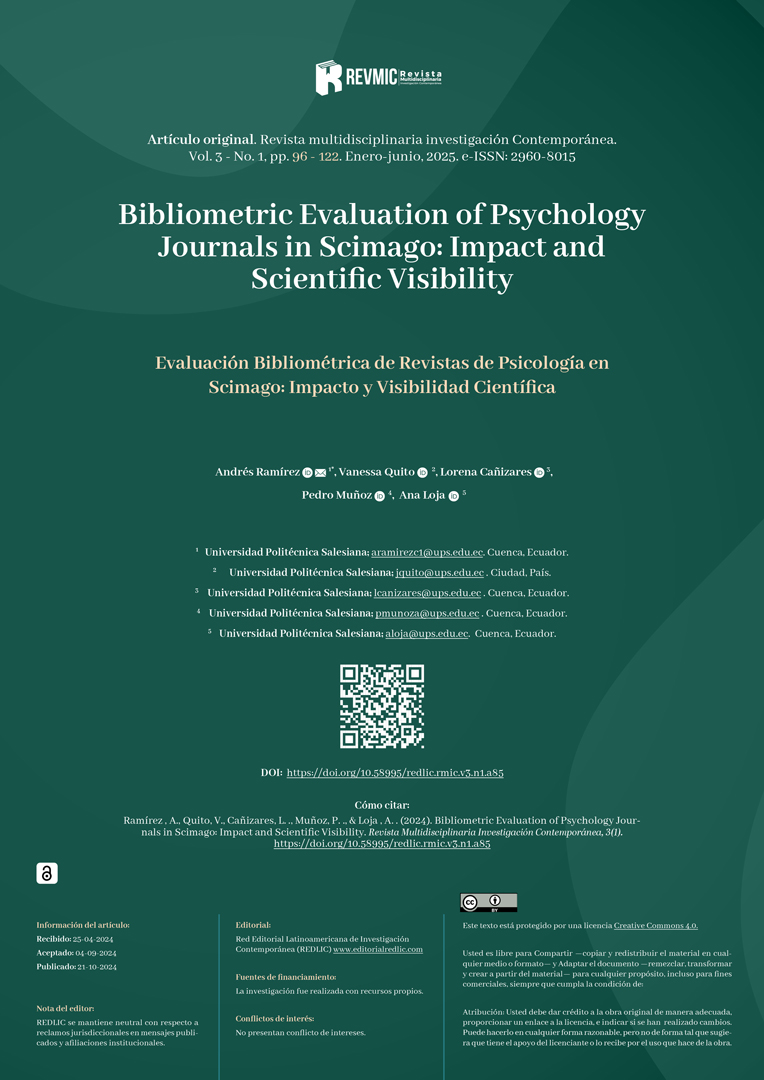
Publicado 2025-01-10
Palabras clave
- psychology,
- bibliometrics,
- evaluation
Número
Sección
Derechos de autor 2024 Los autores que publiquen en la revista Multidisciplinaria Investigación Contemporánea aceptan los siguientes términos: 1. Los autores mantienen sus derechos de autor (copyright) y otorgan a la revista Multidisciplinaria Investigación Contemporánea el derecho de la primera publicación de su trabajo, bajo una licencia Creative Commons Attribution 4.0. Esta licencia permite que terceros utilicen el contenido publicado, siempre que se mencione la autoría y la primera publicación en esta revista. 2. Los autores pueden establecer acuerdos adicionales para la distribución no exclusiva de la versión publicada de su artículo en otros lugares, como repositorios institucionales, siempre y cuando se indique claramente que el trabajo fue publicado por primera vez en esta revista. 3. Los autores conservan sus derechos de autor (copyright) y garantizan a la revista Multidisciplinaria Investigación Contemporánea el derecho a publicar el manuscrito a través de los canales que considere apropiados. 4. Se permite y se recomienda a los autores compartir su trabajo en línea (por ejemplo, en repositorios institucionales o páginas web personales), una vez que el manuscrito haya sido aceptado para su publicación. Esto puede conducir a intercambios productivos y a una mayor y más rápida citación del trabajo publicado.

Esta obra está bajo una licencia internacional Creative Commons Atribución 4.0.



